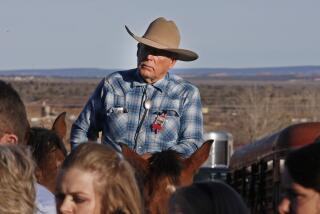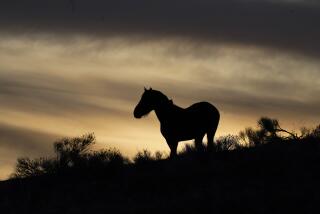Ranchers Applaud Nevada Law Hobbling Cattle Seizures
- Share via
RENO, Nev. — A property rights group is claiming victory in the latest conflict between ranchers and federal land managers over livestock impoundments on Nevada’s public lands. But so far, the feds have shown no sign of admitting defeat.
The combative ranchers are welcoming a grand jury report and a new state law that orders federal land managers, for the first time, to obtain a court order before seized cattle change hands.
“The days of paramilitary cattle confiscations are over, I hope,” said Ramona Morrison of the Nevada Live Stock Assn., a group that largely disputes federal control of public lands.
“I think everybody got their nose bloodied sufficiently and they won’t want to do it again,” she said. “The end result is BLM isn’t confiscating cattle anymore.”
But the U.S. Bureau of Land Management, which oversees 48 million acres in Nevada, continues to reiterate its authority under federal regulations to seize cattle administratively -- without a court order or other judicial review -- after notice and warning requirements are exhausted.
The BLM said its lawyers were reviewing the new state law.
“It’s accurate that we haven’t done any roundups since that grand jury investigation, but the two facts are not related,” BLM spokeswoman Jo Simpson said. “Impounds are our very last resort to resolving livestock trespass. We have not had any recently that we’ve needed to do.”
The new law, unique among the Western states, comes four years after the BLM seized 62 head of cattle from Goldfield rancher Ben Colvin for nonpayment of grazing fees that the federal government said totaled an estimated $73,000, including penalties. Colvin refused to pay grazing fees, contesting the BLM’s authority over the land.
Caught in the middle of the often-tense dispute was Jim Connelley, Nevada’s chief brand inspector, whose signature was required on certificates for the BLM to transport and auction the cattle.
States rights advocates accused Connelley of violating state law and abusing Colvin’s constitutional due-process rights by signing the documents. In 2003, they successfully gathered enough signatures in rural Esmeralda County to begin a grand jury investigation.
In a report issued June 16, the grand jury said neither Connelley nor the Nevada Department of Agriculture committed indictable criminal offenses.
But the report also said policy statements by the agriculture department and advice given to it by the Nevada attorney general’s office were contradictory and confusing.
State agriculture officials adopted a policy, widely circulated among the ranching industry, that said it would not issue certificates to the BLM or any federal agency unless first authorized by a court.
That was before Colvin’s cattle were impounded.
But as the BLM prepared to seize his livestock, the department’s policy was scuttled by the state attorney general’s office, which said the BLM had sufficient grounds under federal regulations to take the cattle and directed the state agency to issue brand certificates.
“Basically, that department policy was negated by the advice of the [attorney general’s] office,” said Don Henderson, director of the Nevada Department of Agriculture.
The new law, he said, “goes along with what our original department policy was.”
Connelley said the new state law clarified his agency’s role and sets clear standards that must be met before brand certificates were issued for impounded cattle.
“Everybody will have their day in court prior to any action, which is what everybody wants,” said Connelley, a former public lands rancher who helped write the law.
Henderson said his department had since canceled a memorandum of understanding with the BLM concerning impoundments. He said a new one would be negotiated to recognize Nevada’s new mandates.
BLM officials say they will work with the state. But there are a number of points of disagreement that will have to be resolved.
For example, the new law requires that any seizure order come from a “court of competent jurisdiction.” Defining an acceptable court may require interpretation by a judge.
“As I read this, it’s still certainly an open question,” said Preston Wright, president of the Nevada Cattlemen’s Assn., which supports the new law. “I would assume there’s ultimately going to have to be a court case to determine competent jurisdiction.”
The BLM maintains that it is subject only to federal court.
The states’ rights advocates, however, argue the federal government lacks jurisdiction in property disputes and that such issues are the sole jurisdiction of the state.
The state law doesn’t challenge the BLM’s authority on federal land, Connelley said. What’s different, he said, is that the state law kicks in where federal lands meet Nevada pavement.
More to Read
Sign up for Essential California
The most important California stories and recommendations in your inbox every morning.
You may occasionally receive promotional content from the Los Angeles Times.













